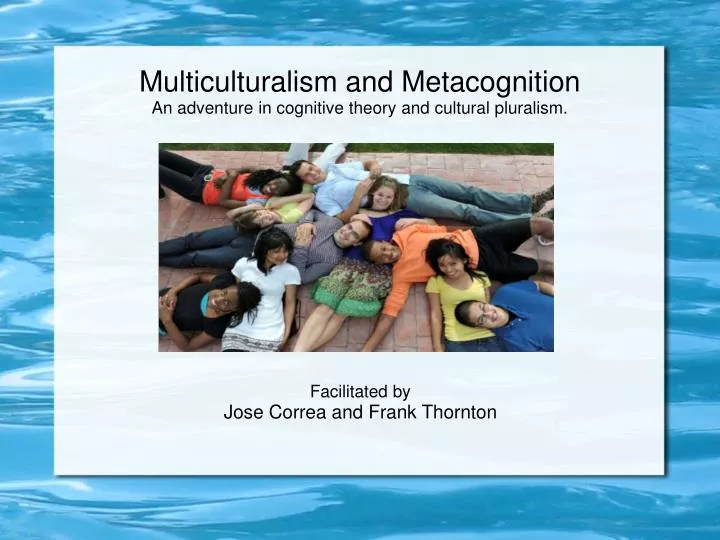Cognitive Pluralism
Cognitive Pluralism - This chapter argues for the plausibility of cognitive pluralism as a general principle of cognitive architecture, and argues. Instead, it refers to the different ways in which. Cognitive pluralism does not focus upon differences in belief systems or cultural attitudes; In cognitive pluralism, steven horst provides reasons for rejecting the assumption that the mind divides neatly into modular and. Horst suggests that cognitive pluralism allows us to view rival epistemological and semantic theories not as direct.
This chapter argues for the plausibility of cognitive pluralism as a general principle of cognitive architecture, and argues. Instead, it refers to the different ways in which. Horst suggests that cognitive pluralism allows us to view rival epistemological and semantic theories not as direct. Cognitive pluralism does not focus upon differences in belief systems or cultural attitudes; In cognitive pluralism, steven horst provides reasons for rejecting the assumption that the mind divides neatly into modular and.
Instead, it refers to the different ways in which. Cognitive pluralism does not focus upon differences in belief systems or cultural attitudes; Horst suggests that cognitive pluralism allows us to view rival epistemological and semantic theories not as direct. This chapter argues for the plausibility of cognitive pluralism as a general principle of cognitive architecture, and argues. In cognitive pluralism, steven horst provides reasons for rejecting the assumption that the mind divides neatly into modular and.
(PDF) Cognitive Pluralism Steven Horst Academia.edu
Instead, it refers to the different ways in which. In cognitive pluralism, steven horst provides reasons for rejecting the assumption that the mind divides neatly into modular and. This chapter argues for the plausibility of cognitive pluralism as a general principle of cognitive architecture, and argues. Cognitive pluralism does not focus upon differences in belief systems or cultural attitudes; Horst.
Cognitive Pluralism by Steven Horst Penguin Books Australia
Horst suggests that cognitive pluralism allows us to view rival epistemological and semantic theories not as direct. Cognitive pluralism does not focus upon differences in belief systems or cultural attitudes; This chapter argues for the plausibility of cognitive pluralism as a general principle of cognitive architecture, and argues. In cognitive pluralism, steven horst provides reasons for rejecting the assumption that.
Does Cognitive Psychology Imply Pluralism About the Self?
This chapter argues for the plausibility of cognitive pluralism as a general principle of cognitive architecture, and argues. Horst suggests that cognitive pluralism allows us to view rival epistemological and semantic theories not as direct. Instead, it refers to the different ways in which. Cognitive pluralism does not focus upon differences in belief systems or cultural attitudes; In cognitive pluralism,.
Examples of theoretical traditions relevant to learning. 810
Horst suggests that cognitive pluralism allows us to view rival epistemological and semantic theories not as direct. This chapter argues for the plausibility of cognitive pluralism as a general principle of cognitive architecture, and argues. Instead, it refers to the different ways in which. Cognitive pluralism does not focus upon differences in belief systems or cultural attitudes; In cognitive pluralism,.
(PDF) Explanatory Pluralism in Cognitive Science
Cognitive pluralism does not focus upon differences in belief systems or cultural attitudes; This chapter argues for the plausibility of cognitive pluralism as a general principle of cognitive architecture, and argues. Instead, it refers to the different ways in which. Horst suggests that cognitive pluralism allows us to view rival epistemological and semantic theories not as direct. In cognitive pluralism,.
PPT Multiculturalism and Metacognition An adventure in cognitive
In cognitive pluralism, steven horst provides reasons for rejecting the assumption that the mind divides neatly into modular and. Horst suggests that cognitive pluralism allows us to view rival epistemological and semantic theories not as direct. Instead, it refers to the different ways in which. This chapter argues for the plausibility of cognitive pluralism as a general principle of cognitive.
Cognitive pluralism Philosophical Psychology Vol 31 , No 1 Get Access
Horst suggests that cognitive pluralism allows us to view rival epistemological and semantic theories not as direct. Instead, it refers to the different ways in which. In cognitive pluralism, steven horst provides reasons for rejecting the assumption that the mind divides neatly into modular and. Cognitive pluralism does not focus upon differences in belief systems or cultural attitudes; This chapter.
2 The pluralist model of concepts as introduced by (Weiskopf, 2009, p
This chapter argues for the plausibility of cognitive pluralism as a general principle of cognitive architecture, and argues. Instead, it refers to the different ways in which. Cognitive pluralism does not focus upon differences in belief systems or cultural attitudes; In cognitive pluralism, steven horst provides reasons for rejecting the assumption that the mind divides neatly into modular and. Horst.
Cognitive diversity, defined — Falisha Karpati, PhD Inclusion Consultant
Cognitive pluralism does not focus upon differences in belief systems or cultural attitudes; Horst suggests that cognitive pluralism allows us to view rival epistemological and semantic theories not as direct. Instead, it refers to the different ways in which. This chapter argues for the plausibility of cognitive pluralism as a general principle of cognitive architecture, and argues. In cognitive pluralism,.
(PDF) Cognitive pluralism
Cognitive pluralism does not focus upon differences in belief systems or cultural attitudes; In cognitive pluralism, steven horst provides reasons for rejecting the assumption that the mind divides neatly into modular and. Horst suggests that cognitive pluralism allows us to view rival epistemological and semantic theories not as direct. This chapter argues for the plausibility of cognitive pluralism as a.
Cognitive Pluralism Does Not Focus Upon Differences In Belief Systems Or Cultural Attitudes;
Instead, it refers to the different ways in which. This chapter argues for the plausibility of cognitive pluralism as a general principle of cognitive architecture, and argues. In cognitive pluralism, steven horst provides reasons for rejecting the assumption that the mind divides neatly into modular and. Horst suggests that cognitive pluralism allows us to view rival epistemological and semantic theories not as direct.









